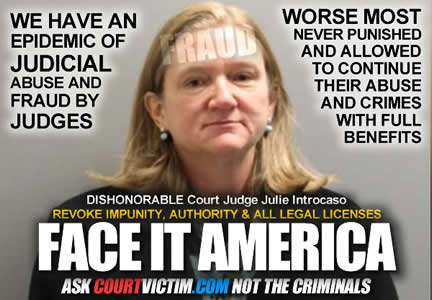CONCORD — The Nashua judge facing criminal charges involving whiting out court records resigned her position on Tuesday, the day before a multi-day hearing was to begin on violations of judicial ethics.
Nashua Circuit Court Judge Julie Introcaso did not contest the numerous ethics violations listed against her, according to an agreement she reached with the Judicial Conduct Committee. Introcaso has been a judge for nine years.
The JCC, which would have conducted the hearing, posted the settlement agreement on its website Wednesday.
In the agreement, Introcaso states she desires to resolve the charges without a hearing and therefore signed the agreement. Her lawyer, former Attorney General Michael Delaney, said Introcaso won’t comment because the matter is pending before the JCC and is subject to Supreme Court review.
Download PDF Introcaso agreement
The agreement does not resolve criminal charges. Last week, acting Attorney General Jane Young announced that Introcaso, 56, was being charged with five crimes. The charges allege that Introcaso whited out an order she wrote in a parenting case once she learned that authorities were investigating a complaint against her by a party in the case.
Introcaso had been on leave since Jan. 21. Once she was arrested, court officials stopped paying her $165,000 annual salary.
The Bedford resident faces criminal charges of falsifying physical evidence, tampering with public records and an unsworn falsification.
The JCC issued formal complaints against Introcaso in October after one of the parties in a parenting case, Robin Partello, complained to the JCC.
Partello has claimed that Introcaso had appointed a friend as the guardian ad litem in the case and issued rulings that favored the friend.
According to the charges, Introcaso knew she was under investigation by the JCC and applied white-out to two orders she issued in the Partello case.
The white-out would have obscured her decision that allowed the fees to the guardian ad litem to exceed a fee cap and whether Apple Pay could be used to cover the fees.
The JCC said a summary of the case will eventually be filed with the New Hampshire Supreme Court. That has not been filed yet, the court system said.
PROBLEM IS WITH JUDGES THE PUNISHMENT NEVER FITS THE CRIME




